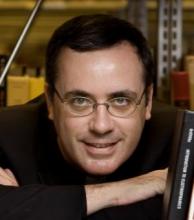What Is It
A theodicy is an explanation by a philosopher or theologian about why a world created by a kind and all-powerful God contains so much suffering. It forces us to think about the nature of good and evil, whether the kind of knowledge an all-knowing God has leaves room for human freedom. Why do people who suffer often find their faith in God growing stronger? Is evil an illusion? Does God really need a defense attorney? John and Ken search for insight with Andrew Pinsent, Research Director of the Ian Ramsey Centre for Science and Religion at the University of Oxford.
Listening Notes
John and Ken ponder over the problem of evil: If there is an all-knowing and all-powerful god, then why is there evil in the world? John suggests St. Augustine’s solution to the problem at least makes our imperfect world consistent with the existence of a perfect god. A world with free will and some suffering is preferred to a determined world with no pain or evil, and so a perfect god might have chosen to create such a world. Additionally, the evil present in our world could be interpreted as part of a larger picture. Without the suffering, the whole might not be as beautiful, and so Augustine thinks it is plausible that God would plan for such evil.
Father Andrew Pinsent from Oxford University is the guest for this show. Father Pinsent was once a particle physicist, but decided the more important questions lay in theology. Soon after John and Ken welcome him to the show, he criticizes the title: he does not believe God has one divine plan. Rather, the plan is always being rewritten. Ken poses the question of why these plans include any evil at all. Father Pinsent’s answer is similar to the big picture response given by St. Augustine. Evil is a part of the overarching story of a life. It can contribute to the beauty of the whole by teaching lessons and making us work towards salvation.
A caller asks Father Pinsent about the story of Abraham: why would a benevolent God ask someone to kill his own son? Father Pinsent interprets the story as God asking Abraham if he trusts God. To understand the story involves understanding Abraham’s life as a whole. Abraham chooses to suspend moral judgment in favor of faith. Ken asks if this tale indicates that faith is meant to be opposed to rationality and require a “leap of faith”. Father Pinsent’s answer is no: faith is not irrational. It is a process of becoming closer with God which can be rationally motivated by religious reasoning. By the end of the show, Ken seems convinced that the problem of evil does not show religion to be inconsistent, but still doubts the plausibility of any way out of this worry.
- Roving Philosophical Reporter (Seek to 4:49): Caitlin Esch tells the story of a nun named Sister Madeline from El Salvador. Sister Madeline lived through a civil war; she saw and experienced extensive suffering. Despite all the evil she saw, she still believes there is no evil in God’s plan.
- 60-Second Philosopher (Seek to 49:13): Ian considers various reasons why God might introduce evils into the world, musing over various types of evil.



